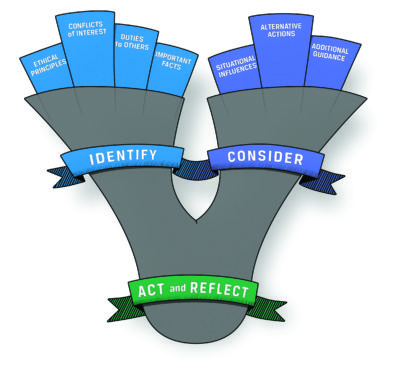Ethics in Practice: Issuer-Paid Research. Case and Analysis–Week of 10 September
How did you do evaluating this week’s (10 September) case? Check out the analysis below.
Case
Estevez is a senior research analyst with BIR, a boutique investment research firm that covers micro- and small-cap companies. These companies hire BIR to provide research coverage to promote their stock to investors who otherwise might not be aware of them. Because of BIR’s stellar reputation, its research services are in heavy demand by both investors and those companies seeking to get on investors’ radar. Estevez helps BIR select the companies that should receive coverage and also oversees a team of junior analysts who conduct the research. Some companies encourage Estevez to select their company for research by providing her a separate bonus if they are included in the BIR research universe. Estevez’s actions are
- unacceptable because her independence and objectivity in conducting the research are compromised if the research is solicited and paid for by the covered company.
- acceptable as long as Estevez does not use material nonpublic information from the company.
- unacceptable if Estevez’s compensation from BIR is tied to the specific findings of the report.
- acceptable as long as her company approves offered payments from covered companies.
Analysis
The facts of this case relate to CFA Institute Standard IV(B): Additional Compensation Arrangements, which requires members to obtain written consent from their employer when they accept any gift, benefit, or compensation that might reasonably be expected to create a conflict of interest with their employer. In this case, Estevez receives a benefit from companies that are selected by BIR to receive research coverage. Because Estevez is involved in the process of choosing the companies that BIR agrees to research, that presents a conflict of interest because she might favor those companies that pay her the bonus.
Issuer-paid research itself is not automatically unethical and does not automatically compromise the analyst’s independence and objectivity. But this area is fraught with conflicts, so important safeguards must be in place. BIR must adopt strict procedures protecting the inviolability of the analyst’s opinion from influence by the company. Such safeguards must also include full disclosure of any conflicts of interests on the part of the analyst conducting the research, full disclosure of any compensation arrangements, including the source of the payment for the research, and policies that disconnect the findings of the research from the level or nature of the payment. In this case, Estevez would have to disclose to her company that she is receiving the benefit from the issuer and BIR would have to disclose to the users of the report that the company paid Estevez the bonus and is paying for the research. The research could be considered independent and objective if Estevez did not use material nonpublic information from the company and if BIR’s compensation for the research from the company was not tied to the specifics of the report. But even if that was the case, it would not alleviate the issue of Estevez accepting bonuses from the covered companies without informing her employer. Choice D is the best answer, although it is incomplete because full disclosure is needed as well.
Have an idea for a case for us to feature? Send it to us at [email protected].
More About the Ethics in Practice Series
Just as you need to practice to become proficient at playing a musical instrument, public speaking, or playing a sport, practicing assessing and analyzing situations and making ethical decisions develops your ethical decision-making skills. The Ethics in Practice series gives you an opportunity to “exercise” your ethical decision-making skills. Each week, we post a short vignette, drawn from real-world circumstances, regulatory cases, and CFA Institute Professional Conduct investigations, along with possible responses/actions. We then encourage you to assess the case using the CFA Institute Ethical Decision-Making Framework and through the lens of the CFA Institute Code of Ethics and Standards of Professional Conduct. Then join the conversation and let us know which of the choices you believe is the right one and explain why. Later in the week, we will post an analysis of the case and you can see how your response compares.
Image Credit: ©CFA Institute

